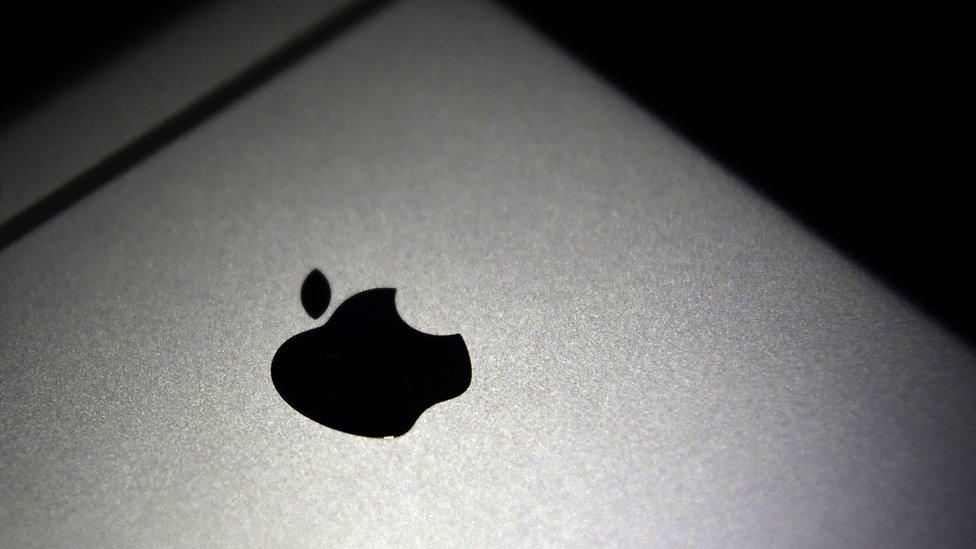Marian Hill: 'An Apple advert kick-started our career'
- Published
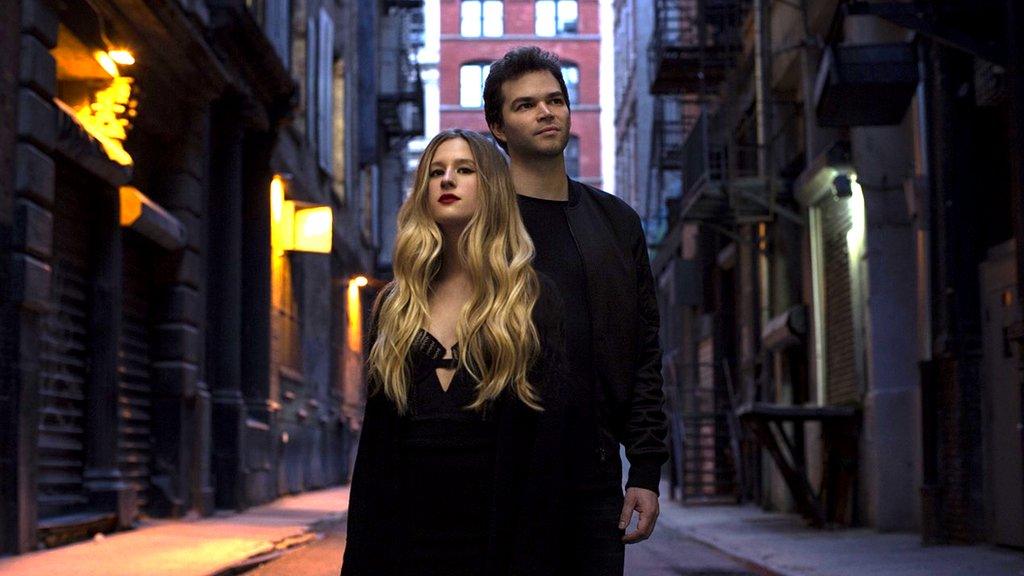
Marian Hill wrote their breakout song, Down, in the space of one night
It's an ordinary day in Advert-ville, USA.
As the black-and-white sun rises over a black-and-white street, authentic-looking extras with a variety of contemporary hairstyles walk past a dilapidated warehouse.
A shoeshine boy flicks open his newspaper, passing time until a customer arrives. None ever will, because shoeshine boys only exist in the movies.
Perched on an upturned milk crate is a tall and slender young man. Let's call him Lil Buck, because that is his name. Bored, he puts in his earphones and fires up a song.
Suddenly, the music brings him to life. He springs off the crate and contorts his body to an irresistible beat, defying gravity as he dances on walls and shop-fronts.
That's how Apple chose to promote, external their new wireless headphones earlier this year - and the song selected for the soundtrack was Marian Hill's Down.
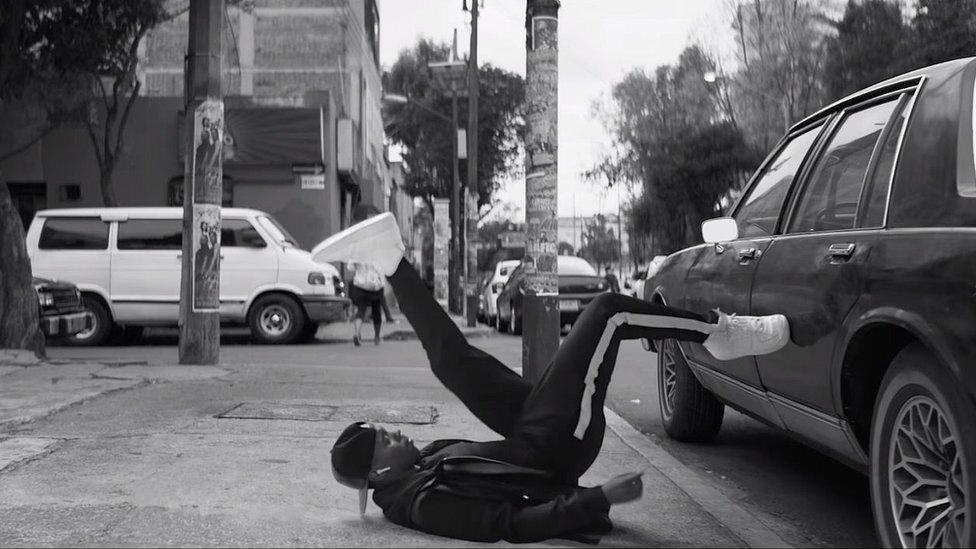
The "Stroll" commercial has been watched more than 12m times
A sparsely atmospheric track, it pits Samantha Gongol's husky voice against a simple piano figure before crashing into a staccato beat in the chorus.
Apple's advertising agency, Media Arts Lab, stressed the importance of finding "an unknown band" for their commercial.
"People get excited when they discover a new band," music supervisor Peymon Maskan told Music Week, external earlier this year.
"They pull out their phone to Shazam the track and they tell their friends. That's a music fan's experience when discovering an ad like this."
Within days of the advert airing, the song had racked up 12 million views on YouTube and Down became the most searched-for song in America - ahead of Ed Sheeran and Bruno Mars.
Nielsen Soundscan, which compiles the charts, said sales of the song jumped from "negligible" (not worth reporting) to 101,000 in the space of a week. In the UK, it was streamed more than 3 million times.
"That commercial was the catalyst for a lot of things," says keyboardist and producer Jeremy Lloyd.
"It put us in so many people's living rooms - and to have them instantly love the song felt so validating for all the work we had done."
As they take a break from making their second album, the duo tell the BBC how they got together and found their sound.

How did the band get together?
Samantha: Jeremy and I have been friends since we were about 12 or 13. We got the name Marian Hill from a production of The Music Man that we were in together in eighth grade. He played Harold Hill, I played Marian Paroo and we combined our character names.
We stayed friends throughout high school and college, until Jeremy showed me a beat and asked if I wanted to write with him. That song was called Whisky, external, and the rest is history.
Right out of the gate you had a unique, minimalistic sound. How did it come about?
Jeremy: We really stumbled into it. At the time we'd written a couple of other things together that were all over the map musically. Then I was playing Sam a couple of different beats and I had one that had this hip-hop feel to it - and that was the Whisky beat. Neither of us had ever made anything like it before.
I was able to recognise how much better it was - and so, for me, the goal became, how do you carry this forward?
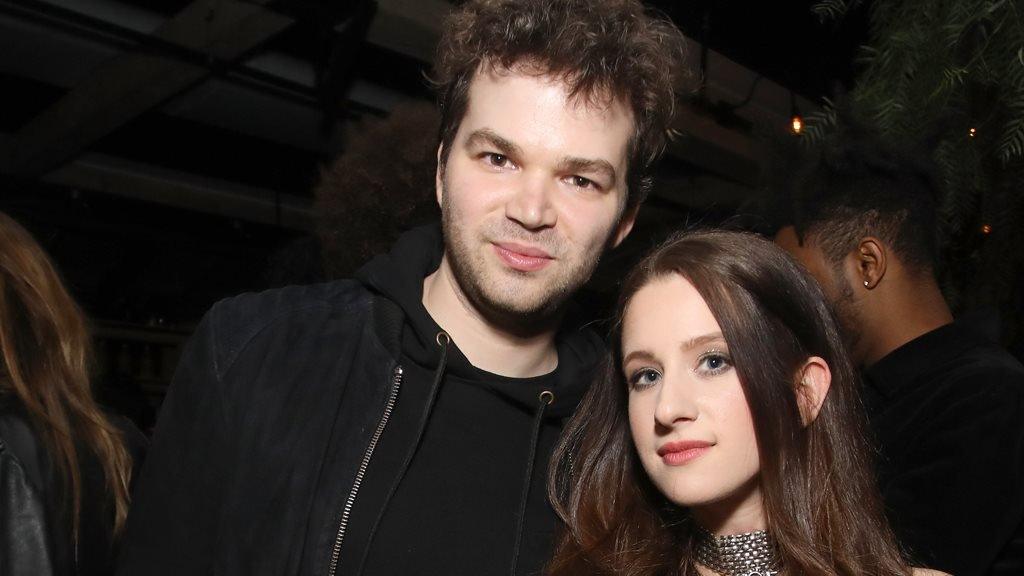
"Jeremy and I can be honest without hurting each other's feelings," says Samantha
And what was the answer?
Jeremy: At that point, it still wasn't that serious, necessarily. It was just a thing we'd made. And when I was about to graduate college, I decided I wanted to give it a real try, so I emailed, like, 50 blogs and thankfully people picked up on the song and liked it. From then on it's been this slow, steady stream of people wanting to hear more.
Samantha, your vocals are very jazzy. Who were your influences?
Samantha: I grew up loving the diva vocalists - Whitney Houston, Lauryn Hill, Ella Fitzgerald, Etta James. I was a huge Norah Jones fan too. That was a huge watershed moment for me, in terms of discovering a contemporary vocalist that I connected with.
Jeremy: So often in songs, there's no room for the vocal to sit - the voice is just pasted on top, so the whole mix is throbbing at the seams. With our stuff I try to make sure the vocal has space, and you can hear all the textures and nuances that would otherwise get lost.
Before Marian Hill, Samantha did some work as a "top liner", writing melodies for big pop singers. What was that like?
Samantha: Writing sessions are kind of like blind dating: You're just thrown into a room together and you hope you get along and make something incredible.
How did you go about writing Down?
Samantha: We were just messing around in the studio and I think the piano line came first, Jeremy?
Jeremy: Yeah, it was the first thing we'd written on a piano. I was goofing around and I stumbled on that piano line. It wasn't like, "OK, we're writing a song now." I wasn't quite sure about it. But I asked Sam, "Do you think we could do something with this?" and she figured out a melody.
Looking back on it, it was such a simple process. I'm pretty sure it was all one night.
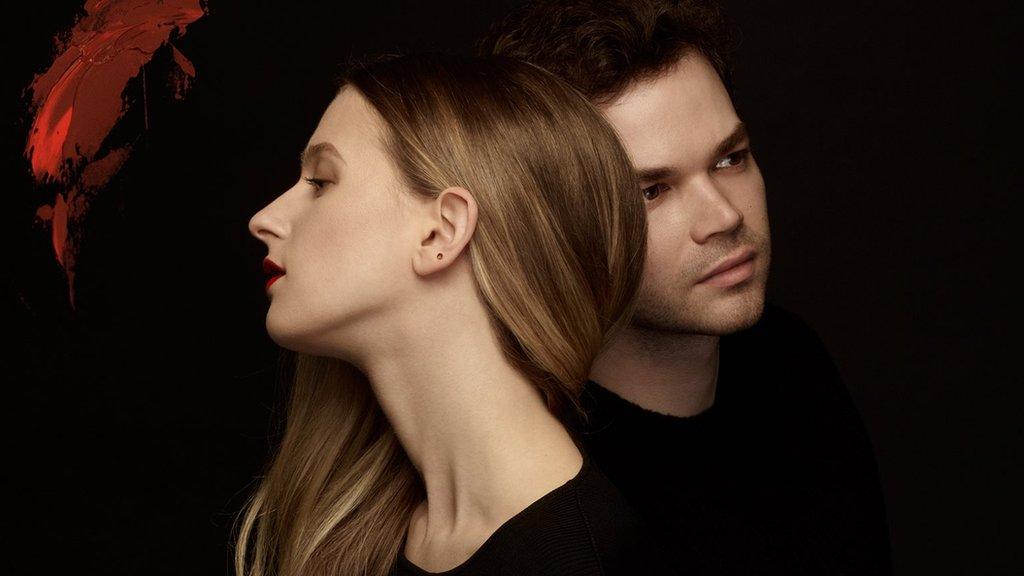
The duo released their debut EP in 2013
The song's about going to a party against your better judgment, is that right?
Samantha: We just wanted to have fun with it. There are so many party songs about getting on the dancefloor and throwing your hands in the air (like you just don't care).
We thought it could be cool to write it from the perspective of Marian Hill, and what it would sound like if we did a song like that. "I'm not sure I want to go, but do you?" And then the crash of the chorus was the party itself.
The Apple commercial really fitted the song. How much input did you have?
Jeremy: We probably would have had a veto if we'd hated it, but it very much was on them. They put it together and we were just like, "Wow, this is perfect."
What effect did it have?
Jeremy: It was amazing because our album [Act One] had been out for a minute and our fans were loving it, but it hadn't really broken out to a larger audience. Having this spotlight, it put us in so many people's living rooms, and to have them instantly love the song felt so validating for all the work we had done. It was a great way to finish off the album campaign.
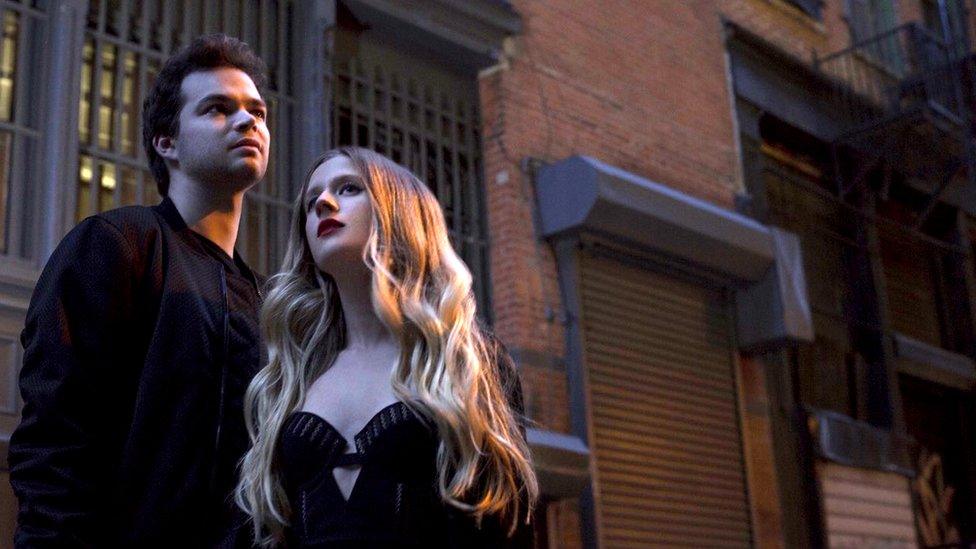
The band will be playing in the UK later this year
So what comes next?
Jeremy: We've been writing a lot over the last two months, together in New York and at home in Philadelphia. It's an exciting point to be at, coming off the success of Down, so we're really excited to get these songs out to our new fans.
What changes are you making compared to the first album?
Jeremy: It's the same aesthetic, only it's a little more brash. But we're right in the middle of it and that direction could change.
And when do we get so hear it?
Jeremy: It will be within a six-month window. We have a deadline in mind.
Samantha: Probably in the fall.
Marian Hill's Act One (The Complete Collection) is out now. They play a headline gig at London's Scala on 9 October.

Follow us on Facebook, external, on Twitter @BBCNewsEnts, external, or on Instagram at bbcnewsents, external. If you have a story suggestion email entertainment.news@bbc.co.uk, external.

- Published7 September 2016
